- Home
- Blake Crouch
The Last Town (The Wayward Pines Trilogy 3)
The Last Town (The Wayward Pines Trilogy 3) Read online
This is a work of fiction. Names, characters, organizations, places, events, and incidents are either products of the author’s imagination or are used fictitiously.
Text copyright © 2014 by Blake Crouch
All rights reserved
No part of this book may be reproduced, or stored in a retrieval system, or transmitted in any form or by any means, electronic, mechanical, photocopying, recording, or otherwise, without express written permission of the publisher.
Published by Thomas & Mercer, Seattle
www.apub.com
Amazon, the Amazon logo, and Thomas & Mercer are trademarks of Amazon.com, Inc., or its affiliates.
ISBN-13: 9781477822586
ISBN-10: 1477822585
Cover design by Cyanotype Book Architects
Library of Congress Control Number: 2013921807
THE HOLY BIBLE, NEW INTERNATIONAL VERSION, NIV
Copyright 1973, 1978, 1984, 2011 by Biblica, Inc. Used by permission. All rights reserved worldwide.
For my angels, Annslee and Adeline
CONTENTS
ABOUT THE LAST TOWN
Then the Lord...
WE ARE THE...
PRELUDE
DAVID PILCHER
I
TWO HOURS AFTER ETHAN BURKE’S REVELATION
JENNIFER ROCHESTER
SHERIFF ETHAN BURKE
KATE HEWSON BALLINGER
JENNIFER
ETHAN
II
PILCHER
THE TURNERS
ETHAN
THE RICHARDSONS
ETHAN
HAROLD BALLINGER
ETHAN
III
ADAM TOBIAS HASSLER
THE RICHARDSONS
BELINDA MORAN
ETHAN
IV
PILCHER
PAM
TED UPSHAW
ETHAN
HASSLER
V
TED
ETHAN
THERESA BURKE
VI
HASSLER
ETHAN
THERESA
ETHAN
VII
HASSLER
THERESA
ETHAN
THERESA
ETHAN
THERESA
MUSTIN
ETHAN
KATE
ETHAN
VIII
THERESA
ETHAN
THERESA
IX
ETHAN
HASSLER
PILCHER
ETHAN
X
ONE MONTH LATER
ETHAN
EPILOGUE
NOW AVAILABLE: THE FIRST TWO BOOKS IN THE WAYWARD PINES TRILOGY
BLAKE CROUCH’S FULL CATALOG
ACKNOWLEDGMENTS
ABOUT THE AUTHOR
ABOUT THE LAST TOWN
Welcome to Wayward Pines, the last town.
Secret Service agent Ethan Burke arrived in Wayward Pines, Idaho, three weeks ago. In this town, people are told who to marry, where to live, where to work. Their children are taught that David Pilcher, the town’s creator, is god. No one is allowed to leave; even asking questions can get you killed.
But Ethan has discovered the astonishing secret of what lies beyond the electrified fence that surrounds Wayward Pines and protects it from the terrifying world beyond. It is a secret that has the entire population completely under the control of a madman and his army of followers, a secret that is about to come storming through the fence to wipe out this last, fragile remnant of humanity.
Blake Crouch’s electrifying conclusion to the Wayward Pines Series—now a Major Television Event Series debuting Summer 2014 on FOX—will have you glued to the page right down to the very last word.
Then the Lord spoke to Job out of the storm.
He said: “Who is this that obscures my plans with words without knowledge? Brace yourself like a man; I will question you, and you shall answer me.
“Where were you when I laid the earth’s foundation? Tell me, if you understand. Who marked off its dimensions? Surely you know! Who stretched a measuring line across it? On what were its footings set, or who laid its cornerstone—while the morning stars sang together and all the angels shouted for joy?”
JOB 38:1–7 (NIV)
WE ARE THE LAST OF OUR KIND, A COLONY OF HUMAN BEINGS FROM THE EARLY TWENTY-FIRST CENTURY. WE LIVE IN THE MOUNTAINS OF WHAT WAS ONCE IDAHO, IN A TOWN CALLED WAYWARD PINES. OUR COORDINATES ARE 44 DEGREES, 13 MINUTES, 0 SECONDS NORTH, AND 114 DEGREES, 56 MINUTES, 16 SECONDS WEST. IS ANYBODY OUT THERE?
—Portion of a voice and Morse code radio transmission broadcast across all shortwave bands out of Wayward Pines superstructure on a continuous loop for the last eleven years
PRELUDE
DAVID PILCHER
SUPERSTRUCTURE
WAYWARD PINES
FOURTEEN YEARS AGO
He opens his eyes.
Frigid.
Shivering.
Head throbbing.
Someone stands over him wearing a surgical mask, face a blur.
He doesn’t know where he is or, for that matter, who he is.
A clear mask is lowered to his mouth.
The voice—a woman’s—urges him, “Take a long, deep breath, and keep breathing in.”
The gas he inhales is warm, concentrated oxygen. It flows down his windpipe and hits his lungs with a welcome burst of heat. Though her mouth is covered, the woman leaning over him is smiling at him with her eyes.
“Better?” she asks.
He nods. Her face grows sharper. And her voice . . . Something familiar there. Not the timbre itself, but the way he feels toward it. Protective. Almost paternal.
“Does your head hurt?” she asks.
He nods.
“That’ll pass soon. I know you’re feeling a lot of disorientation.”
Nod.
“That’s completely normal. Do you know where you are?”
Headshake.
“Do you know who you are?”
Headshake.
“That’s okay too. You’ve only had blood in your veins for thirty-five minutes. It usually takes a couple of hours to find your bearings.”
He stares up at the lights overhead: long fluorescents, far too bright.
He opens his mouth.
“Don’t try to talk yet. Would you like me to explain what’s happening?”
Nod.
“Your name is David Pilcher.”
He thinks that piece of information sounds right. The name feels like his own on a level he can’t quite grasp—at the very least, like a star that belongs in his sky.
“You’re not in a hospital. You haven’t been in a car accident or suffered a heart attack. Nothing like that.”
He wants to say that he can’t move. That he feels as cold as death and afraid.
She continues. “You’ve just come out of suspended animation. Your vitals are all in the green. You’ve been sleeping for eighteen hundred years in one of a thousand suspension units, which you created. We’re all so excited. Your experiment worked. The crew came through at a ninety-seven percent survival rate. Better by a few points than you projected, and with no critical losses. Congratulations.”
Pilcher lies on the gu
rney, blinking at the lights.
The heart monitor he’s attached to begins to beep faster and faster, but it isn’t from fear or stress.
It’s exhilaration.
Within five seconds, it all clicks in.
Who he is.
Where he is.
Why he is.
Like a camera racking focus.
Pilcher reaches a hand up—heavy as a chunk of granite—and pulls the mask away from his mouth. He stares up at the nurse. For the first time in nearly two millennia, he speaks, raspy but clear: “Has anyone gone outside?”
She removes her mask. It’s Pam. Twenty years old and ghost-like in the wake of her long, long sleep.
And yet . . . still so very beautiful.
She smiles. “You know I wouldn’t let that happen, David. We waited for you.”
Six hours later, Pilcher is on his feet and moving unsteadily down the Level 1 corridor, flanked by Ted Upshaw, Pam, Arnold Pope, and a man named Francis Leven. Leven’s official title is “steward” of the superstructure, and he’s talking a mile a minute.
“. . . had one hull breach in the ark seven hundred eighty-three years ago, but the vacuum sensors caught it.”
Pilcher says, “So our provisions—”
“I’m running a battery of tests, but everything appears to have come through fully preserved.”
“How much of the crew has been awakened?”
“Only eight, counting us.”
They reach the automatic glass doors that open into the five-million-square-foot cavern that serves as a warehouse for provisions and building supplies. Affectionately called “the ark,” it is one of the great feats of human engineering and ambition.
A damp, mineralized smell pervades.
Massive globe lights hang down from the ceiling, stretching back into the ark as far as the eye can see.
They walk toward a Humvee parked at the entrance to a tunnel, and already Pilcher is breathless, his legs threatening to seize up with cramps.
Pope drives.
The tunnel’s fluorescent luminaries aren’t yet operational, and the Humvee plunges down the steep, fifteen-percent grade into abject darkness, nothing to light its way but the lonely headlights blazing off the wet rock walls.
Pilcher rides up front beside his henchman.
The disorientation is still present, but retreating.
His people have told him that the suspension lasted eighteen hundred years, but with each breath he takes, that seems less and less possible. In truth, it feels as though only hours have passed since that New Year’s Eve party in 2013, when he and his entire crew drank Dom Pérignon, stripped naked, and climbed into their suspension pods.
His ears release pressure as they descend.
His stomach tingles with nervous energy.
Glancing over his shoulder, Pilcher stares at Leven in the backseat—a lithe young man with the face of a baby but the eyes of a sage.
“We’re going to be safe breathing in this atmosphere?” Pilcher asks.
“It has altered,” Leven says, “but only slightly. Nitrogen and oxygen, thank God, are still the main components. But the makeup is now one percent more oxygen, one percent less nitrogen. Greenhouse gases have returned to pre–Industrial Age levels.”
“I trust you’ve already begun to depressurize the superstructure?”
“That was the first order of business. We’re already sucking in air from outside.”
“Any other pertinent bits?”
“It’ll be a few days until our systems are fully powered up and debugged.”
“Where does our electron clock place us in terms of the Christian calendar?”
“Today is February 14, 3813, in the year of our Lord.” Leven grins. “Happy Valentine’s Day, all.”
Arnold Pope brings the Humvee to a full stop, its high beams shining against the back side of the titanium portal that has protected the tunnel, the superstructure, and all who sleep within from the world outside.
Pope kills the engine, leaves the lights running.
As they all step out of the truck, Pope walks around to the back and opens the cargo doors.
He takes a pump-action shotgun off the rack.
“For God’s sake, Arnie,” Pilcher says. “Always the pessimist.”
“That’s why you pay me the big bucks, right? If it were up to me, I’d have my entire security team rolling with us.”
“No, we’re keeping this intimate for now.”
Leven says, “Pam, would you mind bringing your flashlight over?”
As she shines the beam onto the release wheel, Pilcher says, “Let’s just wait a beat.”
Leven straightens.
Pope heads over.
Ted and Pam turn to face him.
Pilcher’s voice is still gravelly from the drugs that revived him.
He says, “Let’s not let this moment pass us by.” His people study him. “Do you all understand what we’ve done? We just completed the most dangerous, daring journey in human history. Not across distance. Across time. You know what waits on the other side of this door?”
He lets the question hang.
No one bites.
“Pure discovery.”
“I don’t follow,” Pam says.
“I’ve said it before, I’ll say it again. This is Neil Armstrong going down the steps of Apollo 11 to stand on the moon for the first time. The Wright brothers testing their flyer at Kitty Hawk. Columbus walking ashore into the New World. There’s no telling what lies on the other side of this portal.”
“You predicted that humanity would become extinct,” Pam says.
“Yes, but my prediction was just that. A prediction. I could’ve been wrong. There could be ten-thousand-foot skyscrapers out there. Imagine a man in 213 AD stepping into 2013. ‘The most beautiful thing we can experience is the mysterious.’ Albert Einstein said that. We should all savor this moment.”
Leven turns his attention to the release wheel, which he begins to crank counterclockwise.
When it finally locks into place, he says, “Sir? Care to do the honors?”
Pilcher approaches the portal.
Leven says, “It’s this latch, right here.”
Pilcher throws the latch.
For a moment, nothing happens.
The lights of the Humvee cut out.
Only the beam of Pam’s meager flashlight cuts through the darkness.
Something under their feet begins to groan, like an old ship creaking.
The heavy portal door shudders and begins to creak open.
And then . . .
Light spills across the pavement, spreading toward them in a radiant stain.
Pilcher’s heart is pounding.
It is the most thrilling moment of his life.
Snow whisks inside across the pavement, and a shot of bone-chilling cold knifes into the tunnel. Pilcher squints against the light.
When the four-foot portal is fully open, it frames the world beyond like a picture.
They all see a boulder-strewn pine forest in the midst of a snowstorm.
They move into the forest, tracking through a foot of soft powder.
It is beyond quiet.
The sound of falling snow like a whisper.
After two hundred yards, Pilcher stops. The others stop too.
He says, “I think this is where the road into Wayward Pines used to be.”
They’re still standing in a dense pine wood, no sign of a road anywhere.
Pilcher pulls out a compass.
They head north into the valley.
Pines tower above them.
“I wonder,” Pilcher says, “how many times this forest burned and regrew.”
He’s cold. His legs ache. He’s certain
the others feel the same weakness, but no one complains.
They trudge on until the trees break. How far they’ve come, he can’t be sure. The snow has let up, and, for the first time, he sees something familiar—those massive cliff walls that almost two thousand years ago surrounded the hamlet of Wayward Pines.
It surprises him how much comfort he finds in seeing these mountains again. Two millennia is a long time when it comes to forests and rivers, but the cliffs look virtually unchanged. Like old friends.
Soon, their party is standing in the dead center of the valley.
There’s not a single building left.
Not even ruins.
Leven says, “It’s like the town was never even here.”
“What does this mean?” Pam asks.
“What does what mean?” Pilcher says.
“That nature has taken back over. That the town is gone.”
“Impossible to say. Maybe Idaho is now a huge preserve. Maybe Idaho doesn’t exist anymore. We have a lot to learn about this new world.”
Pilcher looks for Pope. The man has wandered twenty yards away into a clearing, where he kneels down over the snow.
“What is it, Arnie?”
He waves Pilcher over.
As the group gathers around Pope, he points down at a set of tracks.
“Human?” Pilcher asks.
“They’re the size of a man’s footprint, but the spacing is all wrong.”
“How so?”
“Whatever this thing is, it was moving on four limbs. See?” He touches the snow. “Here are the hind legs. There are the forelegs. Look at the distance between tracks. That’s one helluva gait.”
In the southwest corner of the valley, they find a collection of stones poking up through the ground, scattered through a grove of scrub oak and aspen trees. Pilcher squats down to inspect one of the stones, brushing the snow away from the base. Once a block of polished marble, time has worn it rough.
“What are these?” Pam asks, running her hand across the top of another similar stone.
“The ruins of a cemetery,” Pilcher says. “The etchings have been eroded. This is all that’s left of twenty-first-century Wayward Pines.”

 Abandon
Abandon Break You
Break You The Pain of Others
The Pain of Others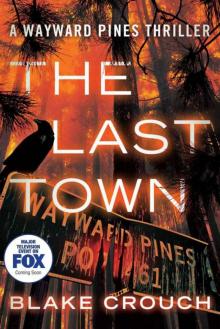 The Last Town
The Last Town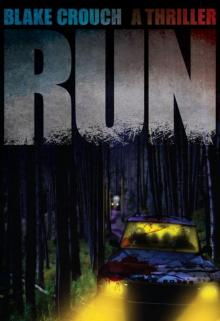 Run
Run Grab
Grab Four Live Rounds
Four Live Rounds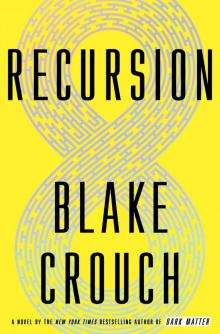 Recursion
Recursion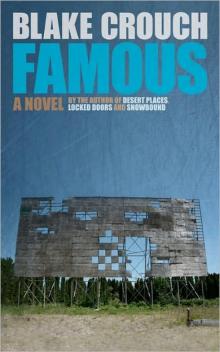 LUMINOUS BLUE: A Novel of Warped Celebrity
LUMINOUS BLUE: A Novel of Warped Celebrity Dark Matter
Dark Matter Desert Places
Desert Places Thicker Than Blood - the Complete Andrew Z. Thomas Series
Thicker Than Blood - the Complete Andrew Z. Thomas Series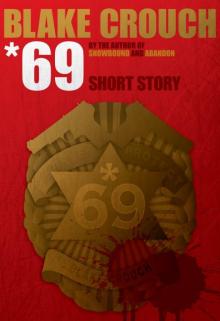 *69
*69 Locked Doors
Locked Doors Fully Loaded Thrillers
Fully Loaded Thrillers![Summer Frost [Forward Collection] Read online](http://i1.bookreadfree.com/02/summer_frost_forward_collection_preview.jpg) Summer Frost [Forward Collection]
Summer Frost [Forward Collection]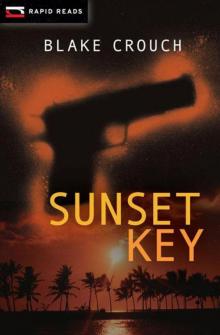 Sunset Key
Sunset Key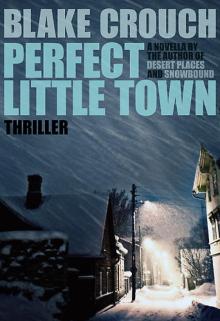 Perfect Little Town
Perfect Little Town Confidence Girl
Confidence Girl The Fear Trilogy
The Fear Trilogy Grab ldm-3
Grab ldm-3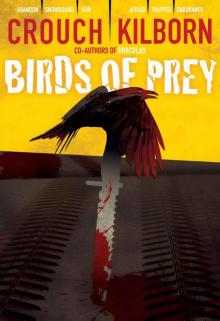 BIRDS OF PREY - A Psycho Thriller
BIRDS OF PREY - A Psycho Thriller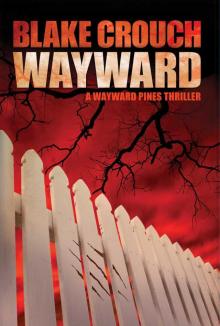 Wayward (The Wayward Pines Series, Book Two)
Wayward (The Wayward Pines Series, Book Two) Hunting Season: A Love Story
Hunting Season: A Love Story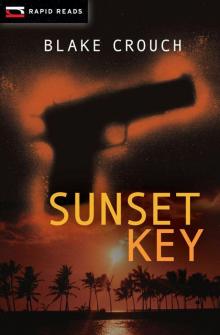 Sunset Key (Rapid Reads)
Sunset Key (Rapid Reads) Desert Places: a Novel of Terror
Desert Places: a Novel of Terror Grab (Letty Dobesh #3)
Grab (Letty Dobesh #3)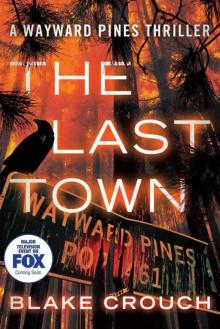 The Last Town (The Wayward Pines Trilogy 3)
The Last Town (The Wayward Pines Trilogy 3) LOCKED DOORS: A Novel of Terror (Andrew Z. Thomas Thriller)
LOCKED DOORS: A Novel of Terror (Andrew Z. Thomas Thriller) BREAK YOU: A Novella of Terror (Prequel to Stirred) (Andrew Z. Thomas/Luther Kite)
BREAK YOU: A Novella of Terror (Prequel to Stirred) (Andrew Z. Thomas/Luther Kite)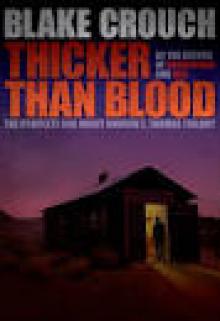 Thicker Than Blood - The Complete Andrew Z. Thomas Trilogy
Thicker Than Blood - The Complete Andrew Z. Thomas Trilogy Bad Girl
Bad Girl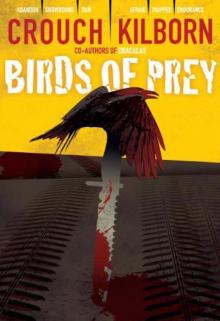 Birds of Prey
Birds of Prey SERIAL KILLERS UNCUT - The Complete Psycho Thriller (The Complete Epic)
SERIAL KILLERS UNCUT - The Complete Psycho Thriller (The Complete Epic) Wayward (The Wayward Pines Trilogy, Book 2)
Wayward (The Wayward Pines Trilogy, Book 2)